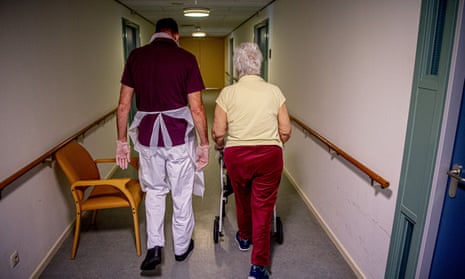Sector has hired 185,000 foreign recruits in last two years, figures show, more than offsetting drop in British workers

Care work has traditionally been female-dominated but men now make up 21% of the workforce in England. Photograph: Robin Utrecht/Rex/Shutterstock
Care work traditionally has been female-dominated but men now make up 21% of the workforce in England, the first time they have represented more than a fifth of care workers since records began.
The figures from the government-funded agency Skills For Care also showed the care work vacancy rate, which had made providing care difficult in some areas, dropped from 10.6% in 2021-22 to 8.3%.
Over the last two years 185,000 international recruits of 130 different nationalities joined the workforce, more than offsetting a decline of 70,000 in the number of British workers. Thousands of people have come from countries such as Nigeria, India and Zimbabwe.
The average wage for a care worker is £11.58 an hour – just 14p above the national minimum wage and less than a typical McDonald’s worker. Turnover is high with almost a quarter of staff leaving in the last year, with wages rising by only 10p an hour on average after five years of experience.
The GMB trade union said the figures showed the need for fair pay agreements for care workers, who are typically employed by private companies. Such an agreement is expected to feature in the employment rights bill to be published by Labour on Thursday as a starting point to allow workers and trade unions to negotiate pay and terms with employers.
Research has previously shown that the migrant care workforce typically includes more men than the UK-born care workforce. In London, nearly half of all care workers now come from abroad.
Jane Townson, the chief executive of the Homecare Association, which represents domiciliary care providers, said: “In many countries where migrant care workers come from, care work may be seen as more gender-neutral or as suitable work for men, compared to the UK where it has traditionally been viewed as ‘women’s work’.”
She said that for many male migrants, care work also offered a relatively accessible entry point into the UK labour market, even if it was not their preferred or long-term career choice.
Prof Oonagh Smyth, the chief executive of Skills for Care, said international recruitment had been vital in helping the social care workforce grow, “but we can’t count on this continuing as we’re starting to see less of it – and the global job market is a competitive one.
“We need to stem the tide of British care workers who are leaving their jobs and we can only do that by improving the quality of care roles so the sector can be more competitive in local job markets.”
In the last year 105,000 international recruits started direct care-providing roles in the independent sector while the number of Britons in the workforce shrank by 30,000.
Source: https://www.theguardian.com/society/2024/oct/10/record-numbers-men-working-social-care-england-immigration

